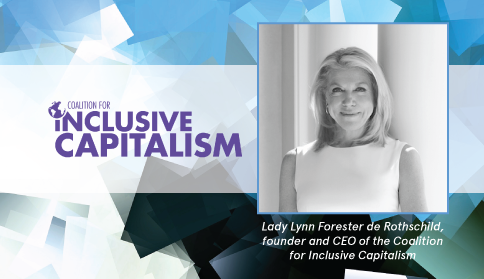Finsbury 03 Oct 2016 // 4:22PM GMT

With the US election and the Brexit referendum underscoring persistent populist distrust in the corporate world, Finsbury’s Graham Buck is speaking to some of the business leaders working to restore capitalism’s credibility. Following his interview with JUST Capital, Buck talks to Lady Lynn Forester de Rothschild, the chief executive of E.L. Rothschild and founder and CEO of the Coalition for Inclusive Capitalism.
What does “Inclusive Capitalism” mean?
Inclusive Capitalism seeks to engage business, investment, government and civil society leaders in an effort to make capitalism more equitable, sustainable, and inclusive. It is a response to the low levels of trust and optimism in our society and an attempt to create long-term and broad-based prosperity. We can achieve this through fostering business and investment practices that extend the opportunities of the economic system to everyone.
How did the coalition come about?
We are at a critical moment in history, with popular opinion of capitalism very low and political pressure against the status quo building to a crescendo. There is now a unique opportunity to reshape how we practice capitalism, and for business and government leaders to regain public trust. The Coalition was created as a platform for the Inclusive Capitalism movement to restore capitalism as an engine of broad based prosperity.
In our 2014 Conference in London we introduced the concept of Inclusive Capitalism, and in 2015 we debated the ‘Pathway to Action’. The intention of our conference in New York City in October 2016 is to have organizations take concrete steps towards Inclusive Capitalism by ‘Committing to the Future.’ These commitments revolve around three pillars: promoting long-termism, integrating environmental, social, and governance considerations into investment and business practices, and improving workforce opportunity.
How have you sold the business community on the concept of Inclusive Capitalism?
There is now substantial academic research showing companies that follow inclusive and sustainable standards perform better than those that do not. Additionally, as firms implement these principles in their strategic plans, they and others in the business community see the positive results firsthand. This is how change begins. Our role as a coalition is to help facilitate this movement and the conversation surrounding it. We do this is by convening global leaders to share and discuss best practices for promoting Inclusive Capitalism. At this year’s conference, many organizations will highlight specific actions they are taking to be more inclusive, and everyone will be encouraged to commit to find ways to do the same.
What has been the response from the business community?
The response from the business community has been extremely positive. The transition to a more inclusive and sustainable mode of business is not only possible, but is already happening. Many of the world’s most important asset owners, asset managers, and firms have been successfully implementing more inclusive business practices and showing economic success. We purposefully try not to be prescriptive but rather share best practices and have businesses make their own decisions based on what is most material to them.
What is an example of a company successfully integrating the principles you are advocating?
A great example is Mark Bertolini, the CEO of Aetna. He launched a “social compact” with employees, increasing the minimum hourly base wage to $16 and creating a program to reduce out-of-pocket health expenses for employees. Mark said that people working for a Fortune 50 company should not be struggling to make ends meet. He also said that the move would benefit Aetna by cutting the $120 million turnover cost spent each year. Since then, Aetna has experienced a productivity increase of $3,000 per employee and outperformed their peers by four times.
Was the Brexit vote an acclamation or repudiation of Inclusive Capitalism?
When capitalism is not inclusive, when it leaves people behind, popular resentment can build up against the system. People get angry at open borders, free trade, failing industries, and corporate excess—all the things they feel harmed by, things that they perceive are stealing their livelihoods. The Brexit vote was a manifestation of that anger, a sign that people feel disenfranchised and excluded by their own economy and do not trust the establishment. In that sense, Brexit was a repudiation of exclusionary practices and a cry for a more Inclusive Capitalism. While the values of the “Leave” and Inclusive Capitalism movements are dissimilar in many ways, they are both responses to a system that doesn’t work for a great enough majority. Each seems to be a unique reflection of an ongoing debate over how we prioritize what our societal values.
What’s next for Inclusive Capitalism? Where does the movement go from here?
The movement is gaining momentum, but there’s still a lot of work to be done! There have been several pioneers of the Inclusive Capitalism movement and many other companies are starting to see first-hand that Inclusive Capitalism reaps not only social benefits, but superior financial returns as well. It’s essential that we keep up the movement’s momentum, scaling up our efforts to ensure that there is an increase in market-driven incentives for companies to make real changes. The ultimate goal is for inclusive practices to become the standard.
How can companies get involved in the movement if they are interested?
We will be publishing a list of Inclusive Capitalism best practices after our Conference in early October of this year. We encourage organizations to consider making commitments. To learn more visit our website: www.inc-cap.com
By: Graham Buck, Senior Vice President at Finsbury


































.jpg)





---copy.jpg)









